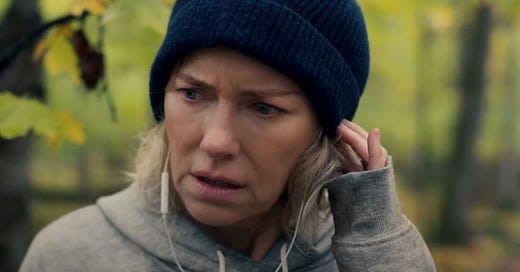The Desperate Hour
Naomi Watts plays a frantic mother reacting to a tragedy at her son's school in this tense and taut real-time thriller.
When I was young, I thought that the biggest factors that divide people were race, class and gender. Then I started a family and realized there’s only really one thing that truly distinguishes us: parents and people without children.
It’s a line you step over — hopefully enthusiastically — and can never cross back. Everything in life looks different to you after you have kids. Things you used to think unimportant become a critical part of your daily life, and many things you thought vital turn out to be utterly disposable.
If you’re childless and reading this, you’re probably pissed off right now. I get it; I was too when I read statements like this. Believe me when I say it’s not a “good” or “bad” thing, and I place no value judgement on people who don’t have kids. All I can emphasize is, if you do ever step over to our side, you’ll understand, too.
In “The Desperate Hour,” Naomi Watts plays Amy Carr, a woman defined by her motherhood. She’s of middling years, upper-middle class with a humdrum job as an accountant in the county tax office, has a young daughter, Emily (Sierra Maltby) and a teen son, Noah (Colton Gobbo).
The important thing to know about Amy is that she is all alone. Her husband, Peter, died a year ago in a car accident and she’s just trying to keep things together for the sake of her kids. Amy is past the period of trembling heartbreak and into the phase of aching hollowness.
Emily is a young sprite and has mostly skated on the surface of a river of grief. But Noah has gone in for a long, deep dive.
Inevitably, the boy’s pain has turned its way toward his mother in the form of blaming her, and they’re not currently speaking. As the story opens, Noah is stuck in bed, pouting and refusing to go to school. Amy takes an unscheduled personal day and heads out for a long jog in the lush, forested woods around their bucolic town, Lakewood.
Even while running, as a mom Amy is a second-nature multi-tasker, juggling calls and texts: arranging a carpool for Emily with other moms, checking in with the mechanic to make sure her parents’ car is done, confirming with her mom their flight arrival, taking a question from work, etc.
Even miles from anywhere, a mother is always “on.”
But even this slight interlude is invaded. Police cars go screaming by at high speeds. She catches smatterings of disturbing calls. A newscast is garbled by the poor reception. But it all points to the same thing, a parent’s most terrifying event: a single shooter at Noah’s school.
Amy’s dilemma is a simple one, but profound: she’s miles from nowhere, so it would take an hour to run to the school. Even a Lyft ride is a long ways off due to the emergency snarl. So she must run, run, run toward her children, hoping against hope that she’s not too late.
The movie, written by Chris Sparling, is 86 minutes long and takes place entirely in real time. This gives it the gut-punch impact of “you are there” immediacy. Director Phillip Noyce is an old-school master at the thriller genre (“Salt,” “Patriot Games”) who knows exactly how to stir the plot, building tension to a boil until downshifting to cathartic release… until the next anxiety-inducing sequence, that is.
As she runs, Amy places and receives calls and texts, her anxiety ratcheting up to the moon as the situation grows more dire. She finds a sympathetic ear in Dierdre Wilkinson, a (never seen) 911 operator who’s on the ball and helping Amy as best she can. Multiple trips and falls brought on by her panic result in injuries, impeding her progress even more.
More alarming are conversations with police detective Poulson, who asks probing questions about Noah: Did he go to school today? No, Amy doesn’t think so, but he isn’t answering his phone. Has he been depressed lately? Majorly, Amy admits. Do they have any guns in the house Noah would have access to? Why are you asking this, Amy demands.
Gradually her terror morphs from that of a mother worried about the safety of her kids to wondering if her son could be the perpetrator of this terror, rather than the victim of it. It’s impossible to say which could be more horrifying.
I’ll say no more.
What makes “The Desperate Hour” work so well is the singular plight of one woman who will do anything for her children, but is cut off from them and able to do little more than communicate imperfectly with the greater world. Watts gives an emotionally invested performance, making us feel Amy’s pain and fear and anger as a visceral presence.
You don’t have to have children to enjoy the intense entertainment value of this film. But those who do will feel the sharp empathetic pull of children who are in danger, or a danger to others.





